Occupy Central
Occupy Central is a civil disobedience movement which began in Hong Kong on September 28, 2014. It calls on thousands of protesters to block roads and paralyse Hong Kong's financial district if the Beijing and Hong Kong governments do not agree to implement universal suffrage for the chief executive election in 2017 and the Legislative Council elections in 2020 according to "international standards." The movement was initiated by Benny Tai Yiu-ting, an associate professor of law at the University of Hong Kong, in January 2013.
OCCUPY CENTRAL - DAY 44: Full coverage of the day’s events
What 165 sq ft flats tell us about Occupy protests
Mike Rowse says demonstrators are fired up by social injustices in Hong Kong
PUBLISHED : Monday, 10 November, 2014, 5:31am
Put yourself in the position of the students. Against the realities of the housing situation in Hong Kong, a shared tent in Admiralty starts to look like quite an attractive option. Photo: AFP
A lot of people have been struck by the tenacity of the Occupy protesters, wondering how and why they could keep up their occupation of Hong Kong's highways for over a month without showing any signs of giving up.
I may have stumbled on part of the reason. Last week, a report said that one of our major property developers had issued a price list for a newly completed project in Cheung Sha Wan. Some flats are as small as 193 sq ft, the largest just over 500 sq ft. Moreover, these were not the smallest apartments to go on sale recently. Another of our major developers is offering flats of 165 sq ft.
Rub your eyes and look at those numbers again, then pinch yourself and look a third time. That was what I did.
A sales manager is quoted as saying the studio flats are "very suitable for first-time buyers". Surely he meant to say "very small people".
One has to ask what kind of social system we have created where flats this small are considered part of the solution to Hong Kong's housing problems. In any other developed community, they would be considered part of the problem. What kind of economy and property market have we created that only flats of this size are affordable to a significant number of would-be homebuyers? And what kind of political system have we built to sustain such an appalling situation?
Then you go back to a news story from last month which shows the chairmen of these two property developers among a group of business leaders being feted in the Great Hall of the People, by President Xi Jinping no less.
Now you begin to see the big picture. You join up the dots - as those clever students have surely done - and realise why the protesters are so angry about the developments on the political reform front. They are calling for the end of corporate voting because they realise such a practice puts literally hundreds of votes in the pockets of those same property developers who are offering miniscule flats. They are calling for the scrapping of functional constituencies because they realise their existence entrenches the advantages of the "haves" at the expense of the "have-nots".
The most the government has done on corporate voting is to hint that it might be possible to end it in one or two sectors. And it has been totally silent on its proposals with respect to the functional constituencies even though, by its own admission, they need radical reform.
To top things off, we now have a ruling on arrangements for the next chief executive election which effectively means the status quo will be preserved, more or less indefinitely.
The degree of social injustice in Hong Kong is so extreme it screams out for change. If it is to be orderly, it must be faster than gradual. Yet the ruling by the National People's Congress Standing Committee applies a further brake.
Put yourself in the position of the students. They know that, when they graduate, their and their spouse's (if they can scrape up the money to marry) combined income will mean years of frugality while they save up for a deposit on a flat. Given the way apartments are shrinking, it is by no means certain they would both be able to fit in it at the same time, let alone start a family.
Against that background, a shared tent in Harcourt Road right now, rent free, starts to look like quite an attractive option.
I am not a supporter of Occupy Central. It is causing serious hardship to some individuals and small businesses, and is beginning to affect the wider economy to the disadvantage of us all. I hope the demonstrators all go home soon. But I do understand why they went in the first place and why they have had the stamina to cling on.
Mike Rowse is managing director of Stanton Chase International and an adjunct professor at the Chinese University of Hong Kong.mike@rowse.com.hk
This article appeared in the South China Morning Post print edition as 165 sq ft flats offer a window into Occupy protest psyche
PUBLISHED : Monday, 10 November, 2014, 5:31am
UPDATED : Monday, 10 November, 2014, 5:31am
Our youth are special … but no more so than others before them
Alice Wu plays down talk of a gap between today's Hong Kong youth and older folk; in truth, every generation sees itself as different
Joshua Wong is right to say his generation was brought up in a vastly different world compared to his parents'. But whose isn't? Photo: Reuters
Are we at a complete loss when it comes to grappling with the so-called generation gap that has been all over the news lately? What's with the call to create a "youth" subsector in the nominating committee for the 2017 chief executive election, or for the students to organise themselves into political parties?
I guess it beats creating temporary work opportunities for young people - an actual recurring idea in policy addresses of the past.
The fascination with this "new generation" began in late 2009 when protests over the Guangzhou-Hong Kong high-speed rail project brought the so-called post-80s generation to the fore as a "new civil force". Scholarism head Joshua Wong Chi-fung, in his October 29 op-ed in The New York Times, basically laid out his generation's views - a mini manifesto and declaration of war against older folk.
This overemphasis on the generational divide smells a tad too self-important and indulgent. It's like the never-ending race to claim the "greatest generation" title.
Generation clashes are nothing new, and every generation finds a way to speak up. What they say may be different, on issues reflective of the times. We all have to face our own realities, which change. That's why the very people who chanted the mantra of "trust no one over 30" change it, as they age, to "trust no one under 30".
If every generation is so special, then there's not much that's really special.
Wong is right to say that his generation was brought up in a vastly different world compared to his parents' and grandparents'. (But whose isn't?) And Wong isn't completely wrong in generalising that many older folks wanted a stable life, a secure job and some comfort.
But Wong got some things wrong. Generations before don't suffer from some sort of degenerative virus that rendered them unwilling to "want more", as he has asserted to be the one thing that sets his generation apart from the rest. They had ideals; forging and defending peace after living through two world wars wasn't exactly child's play. Providing for their family is as noble an ideal as, say, real democracy.
Wong is also wrong in thinking that his generation is the first to fear being worse off than their parents. No, Gen X beat them to it. How about his generation's depressing job prospects? "McJob" and "ozmosis" are Gen X terms. So are "homeowner envy" (housing problems) and "Brazilification" (wealth gap). These, and more, can be found in Douglas Coupland'sGeneration X.
Wong's generation is worried about jobs, home ownership and livelihoods. That's no different from Gen X, his parents' and grandparents' generations. It's life; and a lot of the time, it sucks.
I'm a Gen X-er, so I'm sorry if, as a member of the persistently "underwhelmed" generation, I have never quite taken to all the brouhaha over generation gaps. By the way, I saw Coupland's classic on sale at a bookstore last week. Perhaps reading it would make the post-80s and post-90s feel better.
Alice Wu is a political consultant and a former associate director of the Asia Pacific Media Network at UCLA
This article appeared in the South China Morning Post print edition as Not so special
PUBLISHED : Monday, 10 November, 2014, 5:31am
UPDATED : Monday, 10 November, 2014, 7:19am
Xi Jinping gives Hong Kong Chief Executive Leung Chun-ying a gift over Occupy demands
Xi gives CY a gift over Occupy demands
The Occupy movement has always fought on two fronts: "real" democracy and the collapse of the Leung Chun-ying administration.
But it's now clear, even to its own leaders, that the immediate goal of full democratisation is unreachable, at least for the 2017 chief executive election.
So there has now been a tactical shift. The student leaders are seeking what they hope is achievable: the de-legitimisation and collapse of the government.
In that sense, the movement has morphed into the long-standing goal of the pan-democratic camp from the first day that Leung took over as chief executive - to expose his political illegitimacy.
The pan-dems' campaign of total non-cooperation must be understood in this context, though it risks the ire of the public, which may well blame them as much as the government for doing nothing.
In recent weeks student leaders have made more conciliatory statements towards Beijing. This includes saying their goal was never to challenge the authority of the central government; and blaming the first round of "biased and defective" political reform consultation on Leung's government, so Beijing might not have really understood Hong Kong people's wishes when it issued the August 31 edict on reform. Consequently, it is necessary for student leaders to hold direct talks with the central government. The real goal is to bypass Leung's government and demonstrate its irrelevance.
But Beijing has turned down any offer to meet, saying it "understands the different views in Hong Kong" and that the August 31 decision reflects its understanding of the city's actual situation.
In the past month, Beijing has repeatedly stated its support for Leung because the Occupy movement's demand for his head is seen as a direct challenge to its authority.
The delay in rolling out the Shanghai-Hong Kong stock exchange through-train has been widely seen by insiders as part of Beijing's effort to signal its displeasure at developments in Hong Kong. Over the weekend, Leung secured the green light for the stock scheme from President Xi Jinping . Coming as popular support for the Occupy movement is waning, it's Xi's gift to Leung for a victory dance.
This article appeared in the South China Morning Post print edition as Xi gives CY a gift over Occupy demands
Government must reach out to young to win their trust and support
PUBLISHED : Monday, 10 November, 2014, 5:31am
New People's Party proposed to bring student leaders into the future committee that nominates chief executive candidates. Photo: EPA
Hong Kong students have never been so high profile. They boycott classes, occupy the streets and scuffle with the police. They also outshine leading political parties in popularity polls, take officials to the negotiating table and make headlines around the world. While their actions are not endorsed by everyone, their aspiration for full democracy is shared by many people. They are no doubt a rising political force to be reckoned with in our society.
The political awakening has prompted calls for the government to better accommodate our younger generation in the establishment. One proposal is to bring them into the future committee that nominates chief executive candidates. This can be done by giving them some of the 60 seats earmarked for farmers and fishermen, according to the New People's Party.
It would be tempting to say the proposal is worth exploring. After all, what the students want is a say in the nomination process. The party rightly said that youngsters and some other sectors are underrepresented on the committee, whose composition is meant to enhance balanced participation from different sectors. The students took to the streets en masse because they felt their voice could not be heard.
But the proposal cannot appease the occupiers, apparently. They turned out because they fundamentally reject the framework that vests nomination with a 1,200-member panel. They are fighting for the public right to nominate rather than representation for themselves. Judging from the initial response from the crowds, they do not seem to be impressed.
The government is set to flesh out the electoral details for public consultation. Whether the proposal is to be incorporated for further discussion remains to be seen. Even if that is the case, implementation will be a challenge. Which sector is willing to give up their seats to the students? Are the seats returned via one person, one vote among students; or will it be a ballot among some youth groups? The lawmaker representing the agricultural and fisheries constituency has already expressed reservations over the idea of taking seats from his sector. Given the change is essentially a redistribution of power, it will inevitably upset vested interests and provoke opposition.
The city's future lies with our younger generation. The government can ill-afford to lose their trust and support. Political representation is one way to achieve reconciliation. More serious soul-searching is needed to bridge the divide.
This article appeared in the South China Morning Post print edition as Reach out to win trust of young
Love lost in the fight for democracy
Occupy organisers aimed to 'embrace equality, tolerance, love and care', but after scenes of violence and confrontation, is this ethos intact?
PUBLISHED : Monday, 10 November, 2014, 6:46am
Six weeks into its struggle for democracy, the once-carefully planned Occupy movement has grown and shifted in ways beyond the imagination of organisers. And that raises a question: is the protest still a civil disobedience campaign?
More than a year before Occupy kicked off, its founders discussed their plans, organised meetings and wrote articles on their thoughts for a civil disobedience campaign. They published a detailed "manual of disobedience" for protesters to follow.
"The ultimate aim of the campaign," the manual says, "is to establish a society embracing equality, tolerance, love and care. We fight against the unjust system, not individuals. We are not to destroy or humiliate law enforcers, rather we are to win over their understanding and respect. We need to avoid physical confrontation, and also avoid developing hatred in our hearts."
But just weeks into the campaign, protesters on Harcourt Road were shoving metal barricades against lines of police officers who pushed back. In Mong Kok, protesters surrounded officers and raised umbrellas to ward off pepper spray and batons.
Occupy Central leaders described the development as an "evolution of the struggle", but said that most protesters were following the basic guidelines of refusing to obey certain laws, but not provoking or resisting police.
Occupy opponents have used the chaotic scenes to justify their view that the campaign is a disruption of social order in the guise of civil disobedience.
"This is not civil disobedience, but a direct challenge to the law and disruption of public order," said Robert Chow Yung, convenor of the Alliance for Peace and Democracy, which has been campaigning against the sit-ins. "What Gandhi did was refuse to pay salt tax to the British government to protest against the laws. What Martin Luther King led was a bus boycott campaign to protest against the reservation of seats for whites. They were not hurting anyone." The Hong Kong protests, he said, had inconvenienced drivers and businesses.
Professor David Graeber, an American anthropologist who was a leading figure in the 2011 Occupy Wall Street movement, said the core idea of civil disobedience was non-cooperation. "Governments can abuse us, or abuse others, because we passively consent to their legitimacy. But we can withdraw that consent," he said.
The academic and activist said he found the local "umbrella movement" absolutely qualified as civil disobedience. He said the diversity of tactics used by participants was a key to success in any social movement and that protesters should respect differences among themselves.
"Everyone who believes in non-violence agrees that we should never initiate an attack, an attempt to hurt, to cause pain and suffering, to another human being," he said. "However, beyond that there is a great diversity of philosophical points of view. Some believe that hurting a human is always bad, even if they are attacking you, but damaging property is entirely legitimate. Others believe that it is acceptable to respond to an attempt to hurt you, or someone you love, in a way that protects oneself, or that other person, so long as one never initiates violence oneself … There is no one right answer to such questions."
Benny Tai Yiu-ting, co-founder of Occupy Central, maintained the protests were still a civil disobedience movement, pointing out they had been largely peaceful despite moments of violence.
"The mode of struggle has gone through an evolution," Tai, a law academic, said in an interview. "Overall, the principles are still observed … In the past we talked about a passive mode of civil disobedience. Now it has turned into an active mode. But this is still civil disobedience."
The eight-page Occupy manual, released in September, laid out eight rules and offered guidelines and practical tips to help the sit-ins proceed peacefully.
The manual advised, "Do not use any masks to cover faces", but that participants should instead use goggles to protect themselves in case police used pepper spray or tear gas. The rule, intended to prevent people from concealing their faces and engaging in unruly behaviour, was soon ignored. Many protesters have since covered their faces with surgical masks, bandanas or cloth to help them breathe should police fire more gas tear or use pepper spray.
Police have accused protesters of hiding their identities while breaking the law by refusing orders to disperse. Some protesters have said they wanted to obscure their faces because of the number of international photographers snapping pictures.
Tai said the organisers had not considered that police might use pepper spray when they drew up their guidelines asking people not to wear masks.
The Occupy manual says that "protesters must not engage in physical or verbal conflicts with law enforcers" and that they should form human chains and lie down if facing arrest. But on the first day of the occupation, September 28, hundreds of protesters pushed against a police line on Harcourt Road, and as the huge number of participants clogged the street, the officers unleashed 87 canisters of tear gas throughout the day. Demonstrators dragged in steel barriers, collected from around the city, and fortified them with wood, concrete and bamboo, blocking traffic and keeping police out.
Six days later, at the satellite protest site in Mong Kok, mobs surrounded Occupy protesters, some of whom were hit and beaten. Several protesters screamed at police, accusing them of colluding with triad members and letting some attackers go free.
Protesters routinely hold open umbrellas in front of police officers' faces, anticipating pepper spray. Police officials have complained that some protesters have poked or pushed officers with them. In Mong Kok, officers have used batons to smash umbrellas out of protesters' hands.
"I understand that some citizens could not help but defend themselves when faced with attack," Tai said. He and some student organisers have said they are planning, at some point, to turn themselves in to police. "I hope a certain number of participants will do so with us," he said.
Chow said the notion of civil disobedience was now "all a sham". "The Occupy Central trio said they would sit there and get arrested. But they are now hiding behind the crowd," he said.
Tsang Kin-shing, convenor of Citizens' Radio, which has been broadcasting without a licence since 2005, said his work was also an act of civil disobedience, to defy what he believes are unreasonable broadcasting laws. He said the Occupy protests would take the concept of protesting in Hong Kong to a new level.
"It is absolutely an era of civil disobedience," Tsang said. "Many new forms of non-cooperation may emerge." For example, he said, some people were suggesting each taxpayer under pay their tax bill by HK$68.90 - symbolising the 689 votes that Chief Executive Leung Chun-ying received in the 2012 election.
This article appeared in the South China Morning Post print edition as Love lost in the fight for democracy
Occupy supporters march to liaison office
Protesters demand Beijing's officials in the city set up talks with the central government
PUBLISHED : Monday, 10 November, 2014, 6:46am
Pro-democracy protesters wearing yellow umbrellas and ribbons make their way from Central to Sai Wan. Photo: Dickson Lee
Hundreds of yellow ribbons were tied outside the central government's outpost in Hong Kong yesterday after democracy campaigners marched from Central to the liaison office in Sai Wan.
 Organised by the Civil Human Rights Front, the march saw hundreds of protesters demand that Beijing overturn its August 31 decision setting strict limits on nominations for the 2017 chief executive election. They also demanded a meeting between Beijing officials and the Federation of Students, as Hong Kong's leaders had failed to break the impasse that had left roads blocked for more than six weeks.
Organised by the Civil Human Rights Front, the march saw hundreds of protesters demand that Beijing overturn its August 31 decision setting strict limits on nominations for the 2017 chief executive election. They also demanded a meeting between Beijing officials and the Federation of Students, as Hong Kong's leaders had failed to break the impasse that had left roads blocked for more than six weeks.
Front convenor Daisy Chan Sin-ying estimated the turnout at more than 1,000, while police put the figure at 740. Many carried yellow umbrellas and ribbons, two key symbols of the Occupy campaign.
Referring to plans by student leaders to head to Beijing, Chan said: "The students are not going to Beijing to beg to Beijing or to ask for their sympathy … we want to face the national power head-on, and reflect the demands of the Hong Kong public to them.
"Hongkongers are completely disappointed at the government in [failing to] find a way out of the current political dilemma."
Federation secretary general Alex Chow Yong-kang, who took part in the march, said the group would write to all 35 local delegates to the National People's Congress to ask them to help set up talks with Beijing. That included Rita Fan Hsu Lai-tai, the only local member of the NPC Standing Committee, the body that took the August 31 decision.
"Fan … can request motions during the [Standing Committee] meetings. This is within what she can do," Chow said. "She has a duty to reflect the views of Hongkongers."
Lawmaker "Long Hair" Leung Kwok-hung, of the League of Social Democrats, managed to throw a yellow umbrella into the liaison office's forecourt, bearing the names of mainland activists detained for supporting Occupy.
The marchers faced a counter-protest by about 20 people from the Defend Hong Kong Campaign. The group urged those taking part in the Occupy movement to turn themselves in to police and accused them of destroying the rule of law.
Meanwhile, a group of Occupy activists released the results of a survey of over 1,300 people in the occupied area of Admiralty. Some 40 per cent had visited that protest zone on more than 21 days. At least 75 per cent favoured allowing the public to nominate candidates for chief executive, while 81 per cent favoured the abolition of functional constituencies in the Legislative Council.
This article appeared in the South China Morning Post print edition as Occupy fight goes to liaison office
Police can arrest protesters who obstruct bailiffs, Hong Kong's High Court rules
Mong Kok and Admiralty occupied zones could be cleared within days, after High Court ruling
PUBLISHED : Monday, 10 November, 2014, 8:20pm
In Mong Kok, all protesters that the Post talked to seemed unfazed by the extension of the injunctions. Photo: Dickson Lee
Police can now arrest Occupy Central protesters who defy bailiffs trying to clear their sit-in sites in Mong Kok and Admiralty, the High Court has ruled.
The court's authorisation for the bailiffs to get help from the police if necessary is a new addition to three interim restraining orders - on behalf of drivers' groups and the owner of a commercial building - in force for the past three weeks.
With the court's permission, the force could start removing barricades and defiant protesters from their occupied zone in Mong Kok as early as tomorrow, according to a police source.
The Department of Justice said yesterday that while the police would provide assistance in respect of the enforcement of the injunction orders, the Secretary for Justice might also "consider taking appropriate action against persons who may have committed the offence of criminal contempt".
In his judgment yesterday, Mr Justice Thomas Au Hing-cheung extended the orders and said officers could remove or arrest people who ignored or insisted on breaching them.
They must, however, offer a brief explanation of the order at the point of arrest, Au wrote.
The judge explained that he allowed the police to step in because the rule of law and due administration of justice were at risk of being "seriously challenged and undermined", as some protesters had been openly disobeying and flouting the court orders.
"Under the rule of law, even if the defendants are of the view that a court order is wrongly granted, instead of simply disobeying it, they should first comply with it but seek to challenge and argue against that order in court," Au wrote.
Au's judgment means the applicants for injunctions against the Occupy movement do not need to return to the courts for further extensions of their orders.
The injunctions were first granted on October 20, to Chiu Luen Public Light Bus, the Taxi Association and the Taxi Drivers and Operators Association, for parts of Nathan Road to be cleared. The court also allowed Goldon Investment, owner of Citic Tower in Admiralty, to remove barricades blocking the building's entrances and exits.
The police source warned that protesters who still refused to move faced arrest for contempt of court. He said the Mong Kok protest zone was likely to be the first to be cleared, either Wednesday or Thursday.
The source said enough manpower would be arranged to deal with any eventuality.
Outside court, solicitor Maggie Chan Man-ki, for the minibus drivers, said: "My clients only want to have the road back to do business."
Transport-sector lawmaker Frankie Yick Chi-ming said no actions should be above the law and well-being of the society. "[Occupy] has plunged our sector into hardship," he said.
But fellow lawmaker Albert Chan Wai-yip said the court had taken into account only the plaintiffs' arguments.
He saw two scenarios should police start clearing the sites: protesters would either get arrested in the thousands, or leave and congregate elsewhere.
Chan said they would consider filing an appeal after consulting lawyers.
This article appeared in the South China Morning Post print edition as Police can arrest protesters who obstruct bailiffs
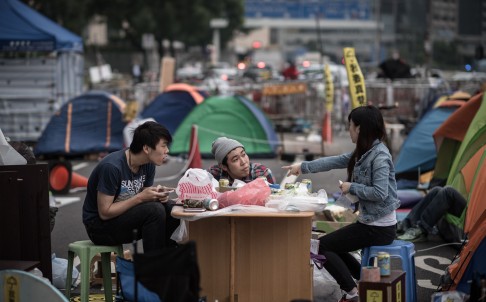

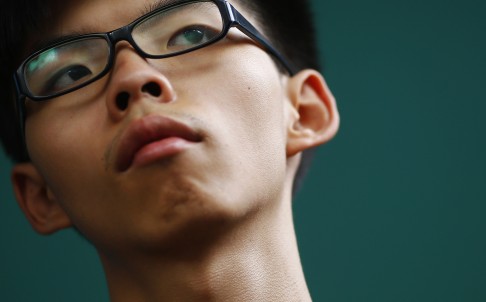

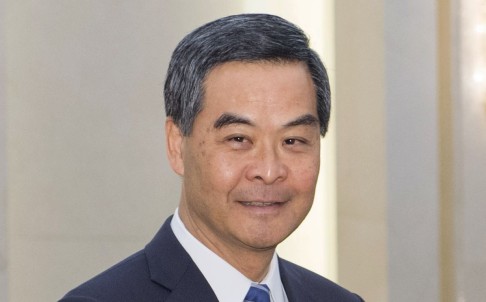


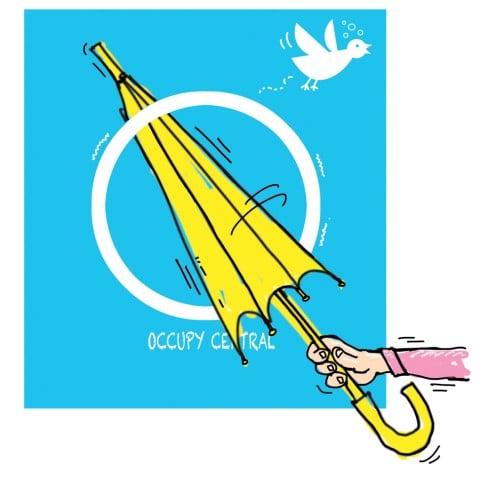

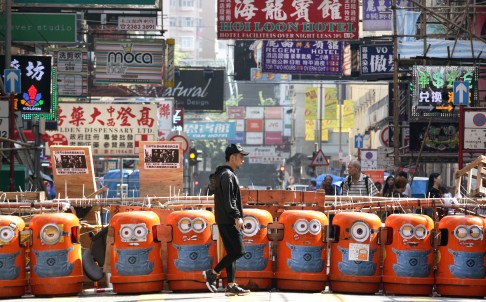
沒有留言:
張貼留言